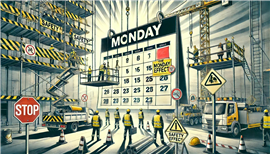‘The Monday Effect’: Is Monday really the most dangerous day on a jobsite?
05 February 2025
 Image generated using artificial intelligence.
Image generated using artificial intelligence.
‘The Monday Effect’ is the name given to a phenomenon that suggests the first day of the working week is the most dangerous on construction sites.
It’s a talking point among construction health and safety experts once again, partly thanks to a 2024 article in Australian publication The Conversation, by Milad Haghani, senior lecturer of urban risk and resilience at the University of New South Wales in Sydney.
There have been numerous academic studies that have examined the idea that Monday is a more dangerous day on construction sites than others, as Haghani pointed out.
They include a study in China that found more fatal accidents occurred most frequently during July and August, on Mondays, and during specific time intervals at the start and end of workdays.
Another, published in the Industrial and Labor Relations Review, found evidence of a ‘Monday effect’ by studying claims to the workers’ compensation board in Ontario, Canada. More compensation claims were logged than on any other days, it discovered, particularly related to back injuries and strains and sprains.
And a 2006 Australian paper found that there were more industrial injuries on a Monday than on any other day of the week, based on compensation claims running over a 20-year period from 1968 to 1988.
Tell me why…(I don’t like Mondays)
“There’s enough evidence obtained through credible studies to suggest that the ‘Monday effect’ is a real and noteworthy phenomenon in the construction industry,” says Nick Higginson, CEO of UK-based health and safety training course provider Phoenix Health & Safety.
Among the reasons he highlights for this are the fact that new tasks or projects can often begin at the start of a week. Workers may be at greater risk of accident or injury because they are unfamiliar with the potential hazards and processes.
 Image generated using AI
Image generated using AI
“There’s also the possibility that weekend weather has created hazards onsite which have not yet been addressed, especially over winter when adverse weather conditions are more frequent and severe,” he adds.
Workers themselves could also be part of the reason why Mondays appear to be more dangerous, if poor sleep patterns or even lingering hangovers from the weekend affect their awareness or concentration, he says.
Paul Goossens, operations manager at SafeSite Facilities, also based in the UK, says he has noticed a lower level of productivity on Mondays, if not a specific trend on increased injuries.
Nonetheless, he finds the idea that injuries could be more prevalent at the start of the week plausible. “Conversations with supervisors reveal that fatigue and a lack of focus often follow team members into the workweek.
“Many workers report feeling tired after their weekend activities, which could lead to lapses in judgement.
“Additionally, occasional tardiness on Monday mornings can result in workers rushing to complete tasks to meet deadlines, potentially increasing the risk of accidents,” Goossens says.
Not a real phenomenon – at least, not everywhere?
But the ‘Monday Effect’ may not be as ubiquitous as some suggest. Amrit Sagoo, head of department, construction management and quantity surveying at Nottingham Trent University does not think it even exists, at least as far as UK-based tier one contractors are concerned.
“I think it depends on the culture of the organisation and also what parameters each country is working under,” he says.
While he can imagine circumstances under which workers have accidents on a Monday if they are returning from a long period of absence like a Christmas shutdown, or where clients are applying pressure to get a project finished on time, burning workers out in the process, Sagoo doesn’t see that amounting to a ‘Monday effect’.
 Paul Goossens
Paul Goossens
“It’s more a case of there having to be a specific set of circumstances,” he says. “The tier ones I have spoken to have indicated that there isn’t such a thing as a Monday Effect. The term is very generalised.”
“In the UK, there’s a lot of monitoring going on, especially following the Building Safety Act that was put into place last year, where people are held accountable for all the activities they are responsible for. Contractors nowadays have very detailed monitoring processes of trades on a daily basis. Use of digital tools is having a profound impact on reducing accidents on construction sites, especially where you have multiple trades working together.”
But he does concede that outside of major, tier one companies the situation could be different. “When it comes to small- to medium-sized organisations, there’s a gap there. I think that that’s where things might go wrong more readily.”
He is currently working on a series of interviews and questions, prompted by Haghani’s article in The Conversation, to explore the topic further for an article.
“It may be happening in Australia or in China, but it gives me an opportunity to examine whether it also exists in the UK,” he says.
And he speculates that the situation in North America, where many workers travel longer distances to get to the workplace, experiencing extra stress in the process, means they are more at risk of accidents at the start of the week.
Meanwhile, Higginson raises the point that studies of compensation claims that show a higher incidence of injuries on a Monday may be skewed by some workers reporting off-the-job injuries sustained on the weekend, such as strains and sprains, once they get back to work so that they don’t lose out on benefits such as sick pay and compensation.
Best practice and guarding against accidents
Whether the ‘Monday Effect’ is a widespread phenomenon or not, Sagoo nonetheless highlights the importance of sharing best practices all the way through the construction supply chain. In doing so, the chances of accidents happening will reduce, he points out.
Higginson points out that there are various measures construction employers can take to lessen the risk of legitimate injuries at the start of the week.
Those could include providing increased notice ahead of a new project with an extended briefing period to ensure that workers are sufficiently prepared, as well as conducting thorough risk assessments onsite after periods of bad weather.
And to combat the risk of falsely reported injuries that actually occurred on a weekend, he adds, “Employers should also ensure they have a rigid incident reporting process in place to make it more challenging for workers to mis-report injuries. This process could include obtaining witness testimony to ensure injuries are accurately reported. Businesses can also work to create a culture where off the job injuries do receive a level of compensation so that employees who cannot work due to injury can obtain some financial support.”
When it comes to workers themselves his advice to them is to make sure they understand and prepare for new projects or stages of a job, as well as getting enough sleep and reducing alcohol consumption on weekends to ensure they are alert and focused on site.
And James Jevon, legal director at global law firm Clyde & Co, which specialises in risk navigation, recommends a series of practical steps to minimise any potential ‘Monday effect’. They are:
- Suitable and sufficient risk assessment including human factors.
- Site management review of work activities, if any, carried out over the weekend to ensure that follow-on contractors are made aware of the potential interface with their works.
- Mandated site inspections prior to commencement of work activities.
- Toolbox talks to raise awareness of relevant hazards, risks, and control measures.
- Fostering a positive safety culture to encourage workers to speak openly about safety concerns.
- Implementation of an effective drug and alcohol policy.
CONNECT WITH THE TEAM





